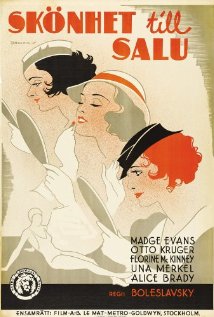
BEAUTY FOR SALE
US, 1933, 87 minutes, Black and white.
Madge Evans, Alice Brady, Otto Krueger, Una Merkel, May Robson, Phillips Holmes, Eddie Nugent, Hedda Hopper, Isabel Jewell.
Directed by Richard Boleslawsky.
Beauty for Sale has two meanings – beauty at the beauty parlour for clients, and women who are beautiful, available to sugar daddies. Both meanings apply in this film which was made definitely before the impositions of the Motion Picture Code.
The film has a New York setting, a young woman coming from the south, impoverished, staying with a family in Brooklyn, rather hounded by the son of the house, but looked after by the young woman of the house who works in the beauty parlour – and who, it turns out, has a wealthy patron who gives her what she wants, and she exploits this.
Despite this being the Depression, the beauty parlour has many clients, rather overfed matrons, wanting artificial beauty, and finding the salon a very good place to gossip, not unlike what would be seen several years later in The Women. Later gossip-writer herself, Hedda Hopper, presides over the parlour, protecting her son who becomes infatuated with one of the girls, gets pregnant and, of course, leaves her in the lurch and she kills herself.
The main character, played sympathetically by Madge Evans, is called out to an ultra-nervous wealthy wife, Alice Brady, and encounters her lawyer husband, Otto Krueger. He makes advances on her. She is in a quandary, attracted by the man, and becoming his companion. Then, she said decides to break off the relationship.
The screenplay contrives to get the lawyer’s wife out of the house, meeting an architect and soon becoming infatuated with him, ultimately wanting a divorce to which her husband quietly agrees. However, the heroine does not go through with a marriage to the young man of the house and, just in the time, discovers that the lawyer is free. Happy ever after. A looser representation of moral behaviour than would be seen in films during the coming years.
1. The title? location? The beauty parlour? The women working at the parlour, the relationships, dependence on men?
2. MGM production values, 1933, the cast, black and white photography, visual style – especially the profiles of the women? Musical score?
3. The setting, New York City, Brooklyn, the apartments, Letty, her mother returning home, paying off debts? With Carol, getting a job? With Bill, his flirting? The clash with Bill, turning down his proposal, his mother and her kindness, but her being upset? Carol support?
4. The beauty parlour, the number of girls working, the number of clients? Rich and pampered women? The scenes of their gossip? Wealth? The girls and
their attending to the clients, being called out to homes?
5. Letty’s story, the background from the South, a good girl, earnest, the clients, Mrs Sherwood, her tantrums? The dog eating the hat, the encounter with Mr Sherwood, going shopping, the hat, sheltering from the rain, his giving her lifts, the attraction? The relationship, knowing that he was married? Moving to the new apartment, with Jane, supporting Jane, supporting Carol? Breaking off with Mr Sherwood? The attentions of Bill, the engagement, the ring, looking at the house in the country, Mrs Sherwood? Carol going to Paris, returning, the lavish life? Jane and her distress, suicide? Letty and Mme Sonia? Mrs Sherwood and her gossip about going to Paris? Letty unable to go through with the wedding?
6. Carol, gold-digger, brassy in manner, with her friend, the dates, his attention, his family? Taking her to Paris, the wealth, return, marriage? Supporting Letty?
7. Mme Sonia, her control of her business, haughty with the girls, protecting her son, her son’s relationship with Jane, the secret, rendezvous, his going on the boat, Jane’s pregnancy, her grief on hearing Letty’s news, killing herself?
8. Mrs Sherwood, her nerves, lazy, pampered? The treatment of her husband, his patience? Her meeting the architect, instantly attracted, discussions, the building of the house, the money? Announcing that she wanted divorce, her husband’s reaction? Going off to Paris?
9. Letty, not married, with Carol and looking at the house, the estate agent, discovering the truth about the divorce, hurrying to see Mr Sherwood, the possibility of marriage?
10. Treatment of love, marriage, divorce in the pre-code films of Hollywood?